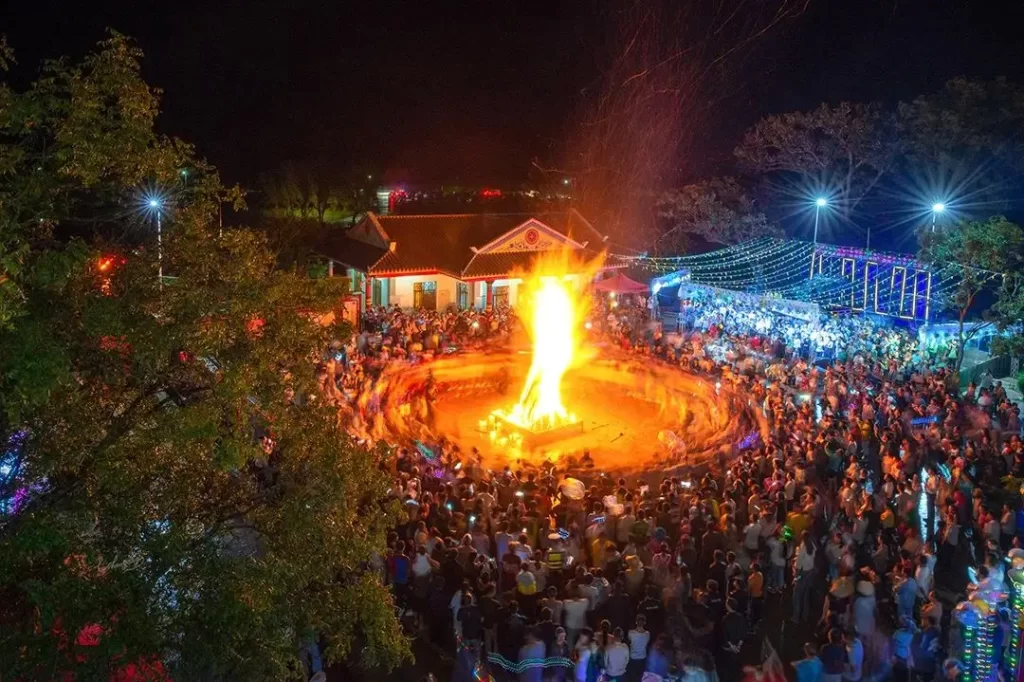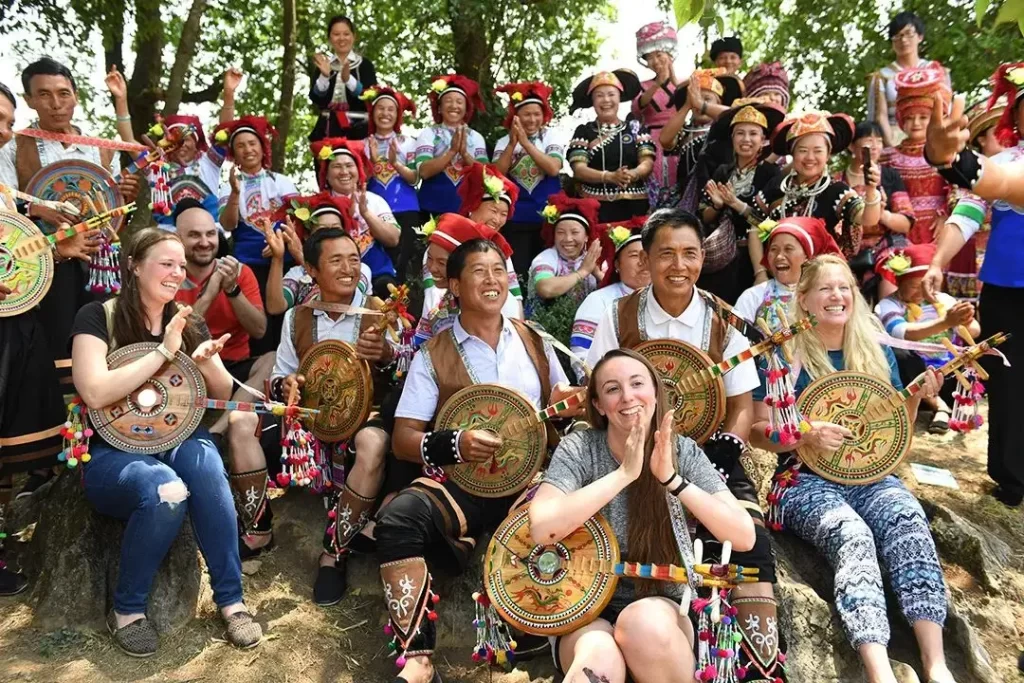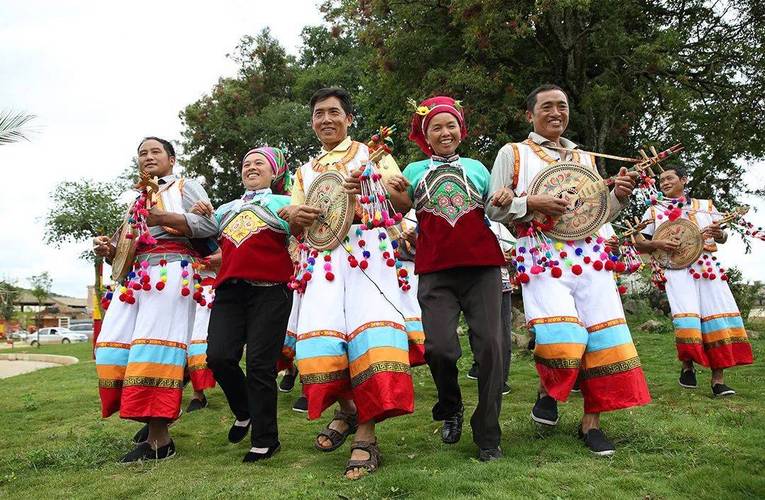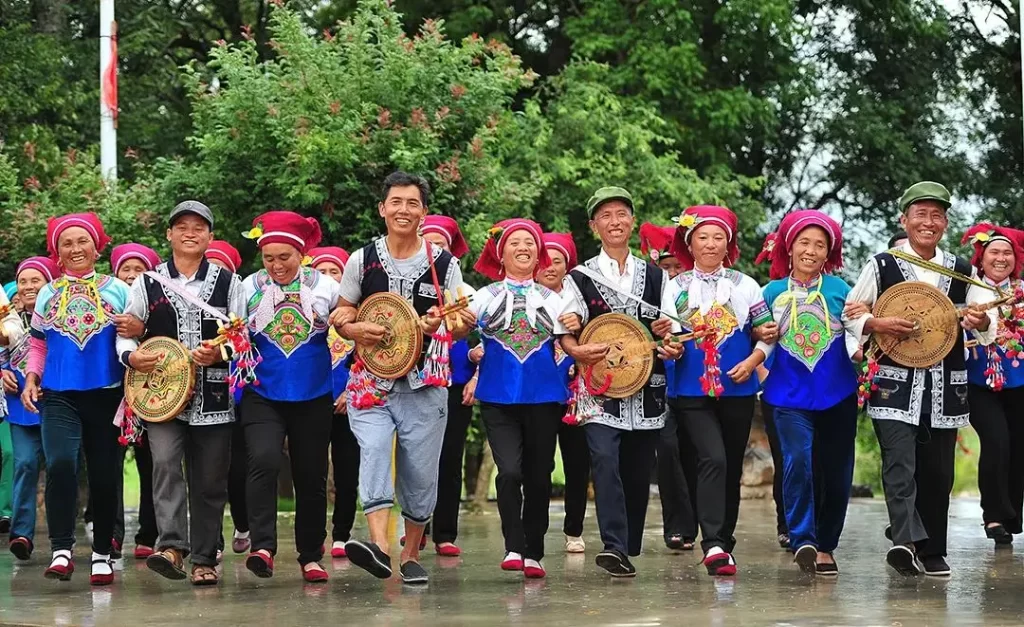
Heiyudong Village of Weimo Yi Ethnic Town in Yanshan County, Wenshan
Chinese Name: 砚山县维摩彝族乡幕菲勒村委会黑鱼洞村
English Name: Heiyudong Village of Weimo Yi Ethnic Town in Yanshan County, Wenshan
Torch Festival of Yi Ethnic Minority in Yanshan County is held in Heiyudong Village of Weimo Yi Ethnic Town.
Overview of Heiyudong Village
Heiyudong Village (黑鱼洞村), located in Weimo Yi Ethnic Town (维摩彝族乡), Yanshan County (砚山县), Wenshan Zhuang and Miao Autonomous Prefecture (文山壮族苗族自治州), is a picturesque village known for its rich cultural heritage, beautiful landscapes, and unique ethnic traditions. Surrounded by mountains and water, Heiyudong is often referred to as the “Hometown of the Xianzi Dance” (弦子舞之乡), where visitors can experience the warmth and hospitality of the Yi people (彝族) and immerse themselves in the vibrant local culture.
Heiyudong Village is part of the Mufeile Village Committee under Weimo Yi Ethnic Township, Yanshan County, Wenshan Prefecture, Yunnan Province. The village is situated in a semi-mountainous area, southwest of Weimo Township. It is 3 kilometers away from the Mufeile Village Committee and 17 kilometers from the Weimo Township government. The village covers an area of 5.27 square kilometers, with an elevation of 1,630 meters. The annual average temperature is 16.4°C, and it receives about 985 millimeters of rainfall each year. The climate is suitable for growing crops such as corn, peppers, and flue-cured tobacco.
Key Features
1. Scenic Beauty
Nestled among rolling hills and vibrant greenery, Heiyudong Village offers a stunning view of nature. The village is surrounded by lush fields, ancient trees, and winding mountain paths, making it a tranquil retreat for those seeking peace and connection with nature. The shimmering surface of the local lake reflects the distinctive Yi-style homes, with villagers often seen fishing by the waterside. The village’s beautiful landscape and natural surroundings create a picturesque environment perfect for exploration and relaxation.
2. Cultural Heritage
Heiyudong Village is renowned for its strong Yi ethnic culture, especially its Xianzi Dance (弦子舞). This lively, energetic dance is a symbol of the Yi people’s passion and spirit. The village’s residents are known for their love of music and dance, with the Xianzi Dance forming an integral part of their cultural life. Visitors can join the locals in this vibrant dance, learning Yi folk songs and experiencing the joy of cultural exchange.
Local Traditions and Festivals
1. Xianzi Dance
The Xianzi Dance is a traditional dance of the Yi people, accompanied by the distinctive sound of a string instrument called the Xianzi (弦子). This dance is widely performed during celebrations and festivals, with the dance movements symbolizing themes of love, nature, and harmony. The rhythmic stomping and swaying of dancers express the emotions of the performers, creating an immersive experience for onlookers.
The Yi people’s love for music is also expressed through their folk songs, such as “Brother’s Xianzi Sound, Sister’s Feet Itch” (哥的弦子响,妹的脚板痒) and “The Bee Comes to the Flowers” (蜜蜂飞来来采花), which reflect sincere and pure emotions of love and longing.
2. Torch Festival
The Torch Festival (火把节) is one of the most important celebrations in Heiyudong, held annually on the 24th day of the 6th lunar month. The village celebrates with grand festivities, including traditional dances, bonfires, and a feast called the Bojidian Feast (簸箕宴), which features local specialties. The festival is an expression of the Yi people’s gratitude for nature and their ancestors, and is marked by vibrant songs, dances, and performances, including the mass Xianzi Dance.
3. Traditional Yi Cuisine
Heiyudong is known for its delicious and diverse Yi cuisine, which is both flavorful and symbolic. Some of the standout dishes include Flower Rice (花米饭), a colorful sticky rice dish, Dried Bacon (灶炕风干腊肉), Beef and Lamb Soup (牛羊汤锅), and Yi-style Pork (彝家坨坨肉). These traditional dishes reflect the agricultural lifestyle of the Yi people and are prepared using locally sourced ingredients.
Cultural Preservation and Experiences
1. Ethnic Culture Museum
In the Yi Culture Museum (彝族文化传承馆), visitors can learn about the traditional agricultural tools, Yi clothing, and folk artifacts that depict the history and customs of the Yi people. The museum provides an immersive experience that highlights the cultural heritage of Heiyudong Village and the surrounding areas.
2. Yi Embroidery and Craftsmanship
Visitors to Heiyudong Village can watch the women of the village demonstrate their exquisite embroidery skills, creating vibrant patterns of flowers, birds, and animals. The embroidery is an essential part of Yi culture, and its craftsmanship has been passed down through generations. It is a testament to the skill and creativity of the village’s artisans.
Travel Information
1. Best Time to Visit
The ideal time to visit Heiyudong Village is during the summer and autumn months (June to October), when the weather is pleasant and the natural beauty of the area is at its peak. Visitors can also enjoy the Torch Festival in June to experience the local culture at its most vibrant.
2. Getting There
Heiyudong Village is located 36 kilometers from the town of Fengtun and is accessible by private car or public transport from Yanshan County. The village is situated near the intersection of Nanhua, Yao’an, and Mouding counties, making it an ideal spot for those exploring the cultural and natural beauty of the Wenshan region.
3. Accommodation
Visitors to Heiyudong can choose to stay in Yi-style homestays (彝家民宿) for an authentic experience. These homestays provide a comfortable environment to explore the local culture, but it is advisable to make reservations in advance, especially during the peak festival periods.
4. Local Cuisine
Don’t miss the opportunity to try local specialties like Flower Rice, Yi-style Dried Bacon, and the traditional Yi Hot Pot. These dishes, prepared with locally sourced ingredients, are a perfect way to experience the unique flavors of the Yi people.
Scenic Beauty and Cultural Heritage
In July, the Yi ethnic homeland of Heiyudong Village is as beautiful as a poetic painting. Known as the “Home of the Xiangzi Dance,” the village is surrounded by mountains and water. It is characterized by simple and ancient customs. Walking into the village, one is greeted by red bricks and blue tiles, Yi-style houses arranged in an orderly fashion, towering ancient trees, lush green mountains, and checkerboard-like fields. The vibrant colors of blooming flowers and green foliage create a picturesque scene that appears straight out of a painting.
Unique Lake Views and Fishing Traditions
The shimmering lake surface reflects the distinctive Yi homes, with dozens of anglers choosing prime spots around the pond, leisurely waiting for fish to bite. Heiyudong Village got its name from a dragon pond within the village where black fish are abundant. These black fish are a symbol of good fortune, representing prosperity and harmony. The village is surrounded by numerous fish ponds of varying sizes. During festivals, these ponds are opened for villagers and visitors to enjoy fishing, followed by a communal fish feast.
Embracing Yi Dance and Music
The Yi people of Heiyudong Village are known for their singing and dancing, particularly their love for the Xiangzi dance. Here, visitors can join the enthusiastic Yi people in hand-in-hand, shoulder-to-shoulder dancing, learn a few Yi mountain songs, and immerse themselves in the local culture. Traditional songs such as “The Xiangzi of the Brother Rings, the Feet of the Sister Itch,” and “The Bee Comes to Rest on the Flower” are sung during these dances, offering a glimpse into the sincere and simple love life of the Yi people. Folk artists and the community have created and performed Yi songs like “Grass Horse Festival,” “Brother’s Xiangzi Rings, Sister’s Feet Itch,” and “The Bee Comes to Pick Flowers,” which are popular among locals and tourists alike.
Preservation of Yi Cultural Heritage
The skills of Xiangzi making and playing, Xiangzi dance, Yi embroidery, the Yi Axi language, and Yi mountain songs have been well-preserved in Heiyudong Village, contributing to customs such as “playing Xiangzi to express love, dancing Xiangzi to celebrate.” These intangible cultural heritage elements are actively practiced and passed down, enriching the cultural life of the village.
The Symbolism of Fire and Torch Festival
Fire is a symbol of the warmth and enthusiasm of the Yi people in Heiyudong Village. The village, shaded by ancient trees, is adorned with the Yi’s fiery patterns. Every year on June 24th of the lunar calendar, Heiyudong Village hosts a grand Torch Festival. The event features traditional dishes in the “Basket Feast,” bonfire parties, and the dance of thousands performing the Xiangzi dance. Young men and women express their emotions through songs and dances, celebrating the Yi people’s historical struggles against natural disasters and expressing their hopes for a prosperous and happy life.
Yi Cuisine: A Taste of Tradition
Heiyudong Village offers a variety of traditional snacks, including sticky rice, known as “flower rice,” which symbolizes good fortune and is named for its red, yellow, white, and purple colors. Other local delicacies include boiled vegetables with beans, stove-dried bacon, beef and mutton hot pot, Yi-style meat (Tuotuo meat), fish with bean paste, cold chicken with bean paste, corn rice (mianmian rice), and steamed wormwood cakes. These traditional Yi foods are irresistible and mouth-watering.
Experiencing Heiyudong Village
Heiyudong Village, though one of many beautiful villages, attracts numerous visitors due to its ancient customs, distinct ethnic features, rich cultural atmosphere, and beautiful rural environment. Here, visitors can listen to the “Black Fish Legend” by the sparkling spring, explore the Yi Cultural Heritage Museum, which houses traditional farming tools, Yi costumes, and other historical artifacts, and watch Yi women embroider flowers, birds, and beasts under the ancient trees.
Evening Bonfire Dance and Celebration
As evening falls, a blazing bonfire lights up the village square. Villagers and guests join hands, stepping to the rhythm of the Xiangzi dance, with laughter and joy resonating throughout the village. Come and immerse yourself in the lively atmosphere of Heiyudong Village, the “Home of Xiangzi Dance.”
Passing Down the Xiangzi Tradition
Zhang Conghai, a villager of Heiyudong, recalls his journey of learning the Xiangzi. He used to sneak into his house to play with the Xiangzi as a child, despite often breaking its strings. Traditionally, the Xiangzi was kept out of reach of children until they were old enough to tune it properly. Zhang learned to play it when he was eighteen. Today, over fifty villagers can play the Xiangzi, with more than twenty of them being his students.
Zhang’s Xiangzi playing style is versatile, ranging from traditional Yi songs like “July Torch Festival” to popular tunes like “Little Apple.” The melodious sound of the Xiangzi often inspires others to join in the dance.
The Xiangzi instruments used by the Yi people are traditionally made by the neighboring Zhuang people. Zhang emphasizes the importance of both playing and making the Xiangzi to preserve this cultural heritage. He began crafting Xiangzi in 2013, incorporating local cultural elements into his designs, such as carving the shapes of the ethnic cultural transmission hall onto the fingerboard as a signature.
Singing into a New Life
In Heiyudong Village, villagers not only play and dance but also sing. Yi mountain songs are an integral part of their cultural expression. Yang Xianxiu, born in 1965, has loved mountain songs since childhood. She organized a group of mountain song enthusiasts in the village to practice and perform. Songs like “Brother’s Xiangzi Rings, Sister’s Feet Itch,” “Yi People’s Labor Production Song,” and “The Bee Comes to Pick Flowers” have become well-known locally and beyond.
Yang explains that mountain songs help ease the fatigue of working in the fields. They are sung to express joy, vent frustrations, or celebrate good news. Recently, the songs have also praised the positive changes brought by government policies, such as road construction, housing improvements, education for children, and the transformation of the village into a beautiful park.
The improved living conditions have also changed the villagers’ lifestyle. Instead of gambling or drinking during their leisure time, they now visit the village library, sing folk songs, and perform Xiangzi dance in the village square. Yang expressed her gratitude for the government’s policies that have made their village so beautiful. As a custodian of Yi mountain songs, she is committed to continuing to sing and improving the lives of the villagers.
Weaving a Harmonious Community
Historically reliant on agriculture, Heiyudong Village has become more ethnically distinct and revitalized with the advancement of the ethnic unity demonstration project. This transformation has attracted city dwellers to enjoy outdoor activities like barbecues, fishing, and buying local specialties, leading to a shift in the village’s economic model. Villager Yang Xiufen shares her experience:
“Previously, I only did embroidery for family use, making clothes and quilts. I never thought embroidery could be a source of income. Now, I am so busy with embroidery orders that I don’t have to do farm work anymore. The orders are overwhelming.”
Compared to farming corn or peppers, embroidery is easier and more profitable. Without the demonstration village initiative, she would have remained a farmer all her life. Through government-sponsored training programs, Yang has learned various embroidery techniques, which she now teaches to others.
According to Pu Junde, Director of the Ethnic and Religious Affairs Bureau of Yanshan County, Heiyudong Village’s rich cultural resources are well-preserved thanks to people like Yang Xiufen, who embrace an open attitude toward preserving and promoting their heritage. The village hosts an annual Spring Festival Gala, uniting the entire community in the pursuit of a better life.
Farewell to Heiyudong Village
As you leave Heiyudong Village, the shimmering lake reflects the distinctive Yi homes, while the elderly pack up their tools and the shepherds return with their cattle and sheep. The village, resonating with the sound of Xiangzi music and the soothing melody of mountain songs, continuously weaves a tapestry of happiness and harmony, fulfilling the dreams of the Yi Axi people.

 7 Days GolfingTour
7 Days GolfingTour
 8 Days Group Tour
8 Days Group Tour
 8 Days Yunnan Tour
8 Days Yunnan Tour
 7 Days Shangri La Hiking
7 Days Shangri La Hiking
 11 Days Yunnan Tour
11 Days Yunnan Tour
 6 Days Yuanyang Terraces
6 Days Yuanyang Terraces
 11 Days Yunnan Tour
11 Days Yunnan Tour
 8 Days South Yunnan
8 Days South Yunnan
 7 Days Tea Tour
7 Days Tea Tour
 8 Days Muslim Tour
8 Days Muslim Tour
 12 Days Self-Driving
12 Days Self-Driving
 4 Days Haba Climbing
4 Days Haba Climbing
 Tiger Leaping Gorge
Tiger Leaping Gorge
 Stone Forest
Stone Forest
 Yunnan-Tibet
Yunnan-Tibet
 Hani Rice Terraces
Hani Rice Terraces
 Kunming
Kunming
 Lijiang
Lijiang
 Shangri-la
Shangri-la
 Dali
Dali
 XishuangBanna
XishuangBanna
 Honghe
Honghe
 Kunming
Kunming
 Lijiang
Lijiang
 Shangri-la
Shangri-la
 Yuanyang Rice Terraces
Yuanyang Rice Terraces
 Nujiang
Nujiang
 XishuangBanna
XishuangBanna
 Spring City Golf
Spring City Golf
 Snow Mountain Golf
Snow Mountain Golf
 Stone Mountain Golf
Stone Mountain Golf













